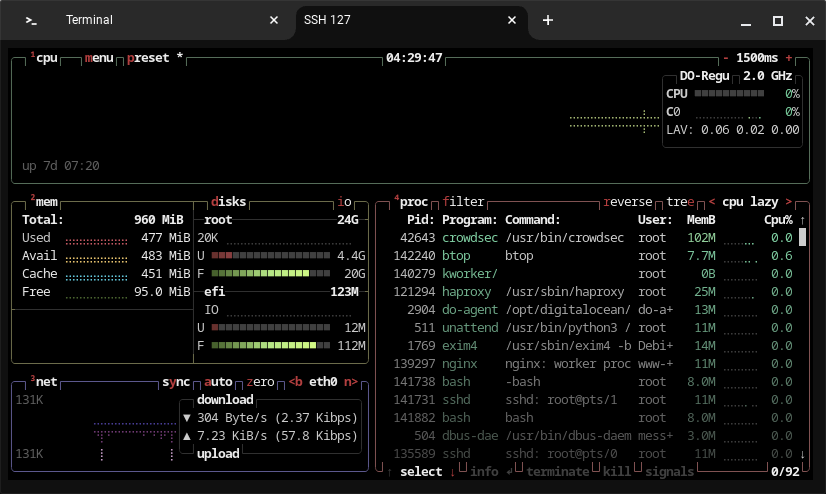I’m going to say yes as I sit here wearing a fedora tank top.
- 3 Posts
- 19 Comments
Just came here to say you could always look for alternative projects that have this built in as well. I’m not sure what logs you as looking at, but it might be best to contribute or request this feature directly for the software.
For example I use crowdsec and they have a button on the logs pages that will anonymize the entire page and is great for taking screenshots.
I agree with another poster that getting something to work with a number of different logs would be a huge undertaking and unrealistic for most solo devs. I do think asking whatever project could be a start. I’d love if journalctl and syslogd etc had a flag to anonymize the log output.
Personally often times I just open the screenshot in gimp and pixelate out the areas I want hidden, but that’s not an automated solution.
I second this. I run fedora on my desktop and debian on the server. Docker works great on debian as well.

 1·1 month ago
1·1 month agoThanks that’s good to learn!

 2·2 months ago
2·2 months agoI saw it put really well the other day. Any software has in general a set number of bugs per lines of code. Something like Debian the number of bugs goes down after release as only bugfixes occur, while anything constantly moving like a rolling release, is certain to grow in number of bugs as the less tested newer software (which generally includes more loc) is pushed. There are tradeoffs to both methods, and edge cases of course.
I’d suggest one of the fedora atomic installs, maybe even get a couple renewed Thinkpads all set up, one with kde and one with gnome and let them play with them for a few days. I was the only engineer in my company that ran Linux and the bosses only concession was that I carry a windows PC too when he was onsite with me so he’d understand what I was doing, but he provided a nice one for me so I never complained.
No offense taken we all have different knowledge and background. I have a general understanding of podman, but now I’m going to go play with it a bit at some point and get more familiar with it.
Docker is Apache 2.0 licensed. It is open source. Or at least all of the important parts. I’m not sure about docker desktop. It’s partly that I just have a lot of experience with docker, and partly just that it’s what is supported in most projects’ documentation. The fact that a lot of the Linux foundation training uses docker is another reason I’ve got more experience with it.
As far as what you are talking about people have been trying for years. The Pirate Bay wanted to develop a new method of being entirely decentralized. Odysee is working on something like blockchain/torrents combined that is very interesting. We have I2P and TOR which have some of the features you mention. I’d love to see it happen where the big companies didn’t control things.
There is progress though. https://letsencrypt.org/ is non-profit, and there are a variety of open source projects using this to automate TLS certificate signing.
Check out https://www.sigstore.dev/how-it-works and pay special attention to Fulcio and Rekor. It’s not for web certs, but it’s still a very interesting take on a certificate authority.
There’s no technical reason what you are saying couldn’t work. It just comes down to how do you trust it, and if you can’t at all, it doesn’t do much good anyway. That’s the problem to be solved. You could compromise somewhere in the middle but then you have to work out what is acceptable. I suppose the level of trust could be configurable, with different nodes earning a different level of trust, and you could configure your accepted levels for DNS or CA. It’s an interesting idea.
Hugo is a static website generator used frequently for blogs. hugo bear blog is just one of the themes for it I happened to like so I used it. It does build reactive sites so that they look good on a phone or a pc.
Yes you can! I’ve attempted on debian before but it’s something like 12 components you have to build and configure and I ran into some issues. It’s been a while though and I don’t remember exactly what gave me trouble. I know I had issues at one point due to the host not having enough ram. If you don’t have at least 8 gigs it’s not going to be happy. At least in my experience.
Let me know how it goes though and what distro you use.
They have pretty good documentation.
I know you said preferably no docker, but greenbone community edition is nice. It’s a fork from nessus back in the day. They don’t really put any restrictions on the community version. If you want to see it in action I have a test server up and running.
I’m not sure where this software comes from, but you should try to get a merge to fix this to default. I’d give it a thumbs up after some testing for sure.
I remember when Ubuntu came out I was working in a PC repair shop. Not gonna give any opinion on this but the standard procedure for people wanting a fresh XP but didn’t have a license key was “well it’s $90 for a fresh install, or we can put a pirate pro corporate on it”. I e-mailed canonical and they sent me a whole stack of Ubuntu CDs in nice branded sleeves. I kept it by the register and started offering that as an alternative to piracy for people that didn’t have a license key and didn’t wanna fork over the cash for one, Not many people chose that option, but I had a lot of good talks with people and plenty of people took a CD to try the live Ubuntu. I hope some of them ended up making the switch. I’m kinda disgruntled with conical these days but I’m an old greybeard who grew up in Slackware. I still recommend Ubuntu to beginners along with fedora.
I would second any Thinkpad that has USB C charging. That’s what I’m looking to get next. Renewed ones are <$300
Haha I love it. c++ is definitely super useful. I never got that deep with it but I’ve certainly benefited from many things written in c++. Wrote small things and I’ve had to debug it on occasion just to get something working. It usually ended up being a compiler flag I had to set. I ended up going into web and network related stuff after college. Perl was my goto back then but I’m loving these newer languages and the thought put into some of it. For example the struct, interfaces, and type systems in go could probably replicate a lot of what you would use the classes and objects for.
I used c++ in college, and I think it’s useful to know c because so much relies on it. That said if I’m going to do something that needs performance I’ll look to go first, then rust if go isn’t a good fit, but that’s mostly because I know go better. Both are excellent languages.
If I just need something functional quick and easily I’ll turn to Python. If I need a net service quick node.js is great.

 4·2 months ago
4·2 months agoVIM for the win. I really enjoy the built in file browser accessed by the command :explore
I also code in go frequently and go-fmt and go-lint etc work flawlessly. You can use whatever LSP you want so you get your code tips and autosuggestion etc.
The tabs and split window functions are nice too. Plus if you learn Vi well it’s on almost every system in existence. Nano not so much
Np. Trying to find the exact page but I just checked the last logs in journalctl after each crash to determine that’s what it was. If you search Wayland + kwin + Intel GPU crash you get lots of hits. It can be fixed but now that I know it’s very specific to my setup and already fixed in future versions I’m not so worried.
I have a similar issue specific to my Intel graphics, debian 12, and kde. It’s fixed in the newer kernel in debian Trixie. In my case I was able to set up a keybind to ctrl-alt-backspace which kills the graphics server. I have to catch it quick or it’ll lock up completely, but it’s something to try. I’m on 15 days uptime now I’ve probably had to do that about 5 times.

I’m stealing this 👍